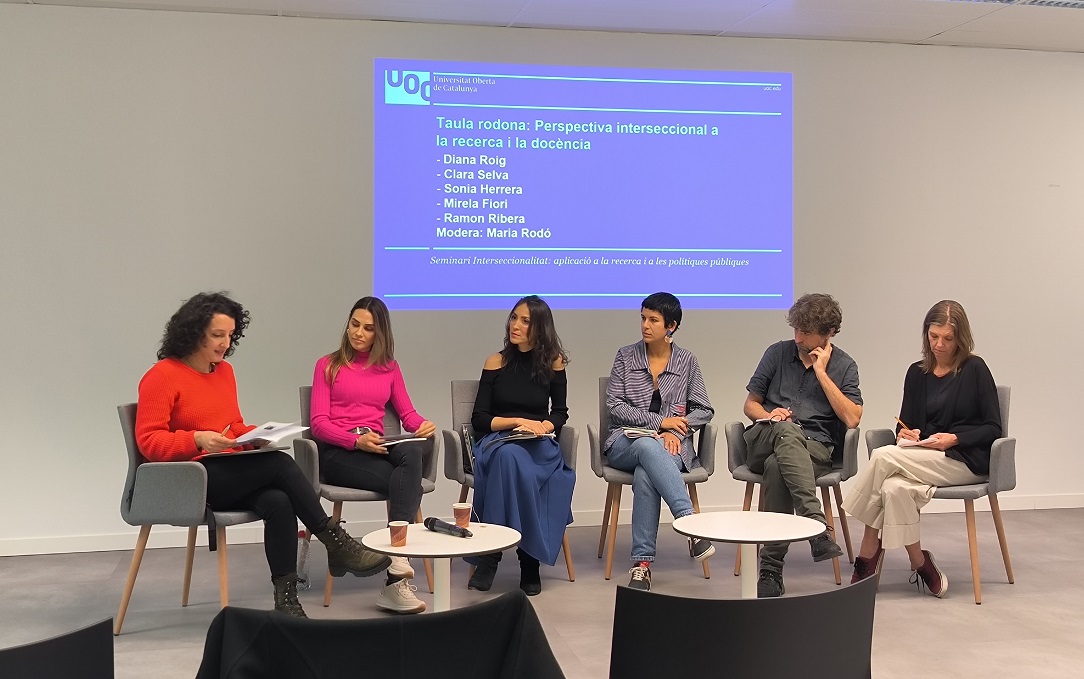On 22 November 2024, the INSPIRE project and the Equality Unit of the Universitat Oberta de Catalunya jointly organised the seminar ‘Intersectionality: application to research and public policies’ in Barcelona. The aim of the event was to provide an in-depth look at intersectionality, diversity and inclusion and to learn about practical applications of these concepts in research and teaching in higher education.
Introduction to the concept of intersectionality
The first session of the seminar, dedicated to deepening the understanding of intersectionality and the specificities of the intersectional approach to addressing inequalities, began with a keynote speech by Maria Rodó-Zárate, a professor at Pompeu Fabra University and coordinator of the INTERMAPS project. Maria Rodó-Zárate reviewed the origins and development of the intersectionality theory. She pointed out that the concept of intersectionality should not be confused with diversity, as sometimes happens when the term is institutionalised, and emphasised that intersectionality shows how social inequalities result from the interaction of different factors. Systems such as patriarchy, capitalism and racism, and the structures associated with them, result in people experiencing multiple and diverse forms of discrimination and inequality. Intersectionality is therefore essential for research to understand how social relations of power and privilege work, and to inform public policy interventions aimed at reducing inequalities.
“In the face of the whitening of the concept of intersectionality, we must not forget that its origins lie in the black feminist movement in the United States in the 1980s. It is important to think about how racism is configured in our context,” Maria Rodó-Zárate noted. In addition, she stressed that the logic of competition between different axes of inequality must be overcome, as all axes are relevant and interrelated in people’s experiences.
Watch the video of Maria Rodó-Zárate’s presentation here (Catalan):
Rachel Palmén, senior researcher at GenTIC and coordinator of the INSPIRE project, expanded on this theme with a presentation on the conceptualisation of intersectionality in research and innovation proposed by INSPIRE. The project is working on a glossary of the different concepts in the field to distinguish between diversity, equality, inclusion and intersectionality. The INSPIRE team is also generating evidence-based knowledge about what different universities are already doing to develop intersectional strategies in practice. “If we look for the ideal intersectional policy in higher education or R&I we will never find it. Let’s focus on traces of intersectionality and produce knowledge on what is working and how”, Rachel Palmén emphasised.
Watch Rachel Palmén’s full presentation here (English):
Part 2: Research with an intersectional perspective
The second part of the seminar included a roundtable discussion of research and teaching projects from Universitat Oberta de Catalunya (UOC) that integrate an intersectional perspective. Diana Roig Sanz, Professor in the Faculty of Arts and Humanities at UOC and director of the GlobaLS research group, presented projects that use maps, data and digital tools to produce feminist, anti-racist and decolonial knowledge in the humanities. Clara Selva Olid, Professor at UOC’s Faculty of Psychology and Education, spoke about a project investigating the impact of menopause on women’s lives, considering factors such as social class, access to economic resources, age and cultural background. Sonia Herrera, Professor at UOC’s Faculty of Information and Communication Sciences, reflected on her research activities, which include critical discourse analysis of audiovisual and cultural productions from an intersectional feminist perspective.
Mirela Fiori, Professor at the Faculty of Law and Political Science, explained how intersectionality is applied in the Master’s programme in Urban and Town Planning that she is coordinating at UOC. In this programme, intersectionality is implemented as a comprehensive inclusion policy that permeates all dimensions of teaching. She stressed that the design of study programmes is a cornerstone, as it is at this stage that criteria are defined that can either perpetuate inequalities or, conversely, promote equal opportunities through compensatory measures. Finally, Ramon Ribera, professor at the Faculty of Economics and Business and leader of the TURBA group at UOC, shared his experience of teaching three courses in which he encourages students to engage in critical analysis by combining geographical-historical materialism, feminist theory, colonial theory and intersectionality.
Part 3: Organisational implications of intersectionality
The third slot of the seminar focused on analysing the implications of integrating intersectionality into organisations. Aran Romero, postdoctoral researcher at GenTIC and INSPIRE project manager, presented practical examples of concrete actions and structural changes implemented in a higher education and research institution, which is one of the case studies analysed by the INSPIRE project. Aran Romero emphasized that this initiative is a pioneering plan for equity, diversity and inclusion in higher education institutions in Spain. Among the strengths that increase the impact of this initiative, he highlighted the multiplicity of actors involved, the interdependence between different units and departments (while maintaining autonomy), and its inductive, trial-and-error approach.
The seminar concluded with a presentation by Maria Olivella, Director of the Equality Unit at Universitat Oberta de Catalunya, who explained the new plan developed to integrate the intersectional perspective into the university’s overall strategy for equality, diversity and inclusion. The UOC’s plan aims to make the university a space that recognises the specific needs of individuals, where everyone can access and remain under equal conditions and free from any form of discrimination.
